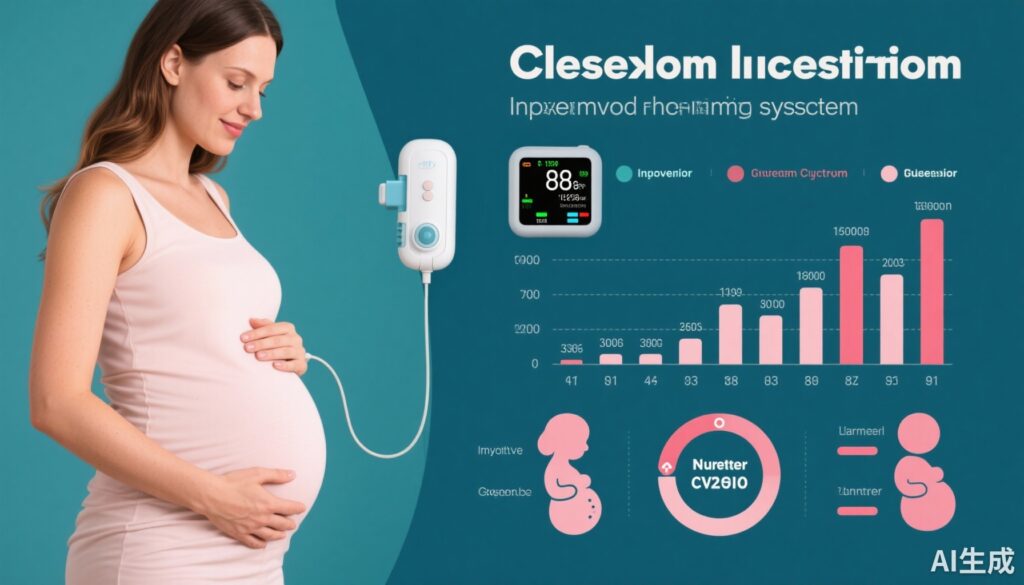Highlights
- The CIRCUIT randomized clinical trial (RCT) showed a 12.5 percentage point increase in time spent within the pregnancy-specific glucose range (63-140 mg/dL) for pregnant women with type 1 diabetes using closed-loop insulin delivery compared to standard care.
- Closed-loop systems demonstrate consistent benefits across pregnancy phases, including labor and postpartum, with additional data supporting safety and reduction in hypoglycemia.
- Subgroup analyses highlight greater benefits in women with baseline HbA1c <7.0%, those new to closed-loop, and individuals without higher education, suggesting targeted clinical advantages.
- Healthcare provider perspectives emphasize challenges in training and support, underscoring the importance of specialized education and mentorship for effective closed-loop rollout in pregnancy care.
Background
Pregnant women with type 1 diabetes face considerable risk from hyperglycemia-related complications, affecting up to 50% of pregnancies and contributing to adverse obstetric and neonatal outcomes. Achieving tight glycemic targets during pregnancy (63-140 mg/dL) is critical yet challenging due to physiological changes and insulin resistance fluctuations during gestation. While continuous glucose monitoring (CGM) and insulin pumps have advanced management, many women fail to maintain optimal glucose control.
Closed-loop insulin delivery systems, integrating real-time CGM with automated insulin dosing algorithms, have redefined diabetes care outside pregnancy by increasing time in target range and reducing hypoglycemia. However, evidence for their efficacy and safety specifically during pregnancy has been limited, primarily due to the absence of pregnancy-tailored glucose algorithms and regulatory approvals.
The CIRCUIT randomized clinical trial, along with complementary trials such as CRISTAL and AiDAPT, have begun to fill this knowledge gap by evaluating closed-loop systems in pregnant populations.
Key Content
The CIRCUIT Randomized Clinical Trial: Design and Outcomes
An international open-label RCT was conducted at 14 centers in Canada and Australia, enrolling 94 pregnant women with type 1 diabetes before 14 weeks’ gestation. Participants were randomized 1:1 to either automated closed-loop insulin therapy or standard care (insulin pump or multiple daily injections) with CGM. Follow-up extended until 6 weeks postpartum.
– Primary outcome: Percentage of time spent in pregnancy-specific glucose range (63-140 mg/dL), from 16 to 34 weeks gestation.
– Results: Among 88 participants analyzed, the closed-loop group achieved 65.4% time in range versus 50.3% in standard care, with an adjusted difference of 12.5 percentage points (95% CI: 9.5-15.6; P < .001).
– Safety: One severe hypoglycemia event in the closed-loop group; diabetic ketoacidosis episodes were comparable between groups.
These data constitute compelling evidence supporting improved glycemic control without increased adverse events using closed-loop systems during pregnancy.
Additional Clinical Trials Corroborating and Expanding Evidence
– The AiDAPT trial (UK multicenter RCT) demonstrated a 10.5 percentage point improvement in time in target range (63-140 mg/dL) with hybrid closed-loop therapy versus standard care, along with reduced hyperglycemia and improved overnight glucose control.
– The CRISTAL trial, involving the MiniMed 780G system, showed improved overnight time in range and reduced time below range but did not find statistically significant overall TIR differences, emphasizing algorithm adaptation needs for pregnancy-specific physiology.
– Smaller feasibility and pilot studies, including at-home use of zone model predictive controller systems customized for pregnancy, reported increased TIR and reduced hypoglycemia without restricting patient activities.
– Postpartum studies indicate closed-loop therapy reduces hypoglycemia risk and supports tight glycemic control during this challenging period.
Subgroup and Mechanistic Insights
Secondary analyses of CRISTAL reveal:
– Greater benefits in women with baseline HbA1c <7.0%, highlighting the potential for closed-loop systems to optimize already tighter glycemic control.
– Enhanced glycemic outcomes in users without prior closed-loop experience and in women without higher education, suggesting that closed-loop therapy may mitigate disparities related to disease management skills or health literacy.
Mechanistically, closed-loop systems adapt insulin delivery in real-time to glucose fluctuations, accounting for pregnancy-related insulin sensitivity changes. Studies comparing insulin basal and bolus distributions indicate that closed-loop systems shift insulin delivery towards more bolus dosing in late pregnancy, better matching physiological needs.
User Experience and Healthcare Professional Perspectives
Qualitative research among pregnant women reveals mixed psychosocial effects: initial concerns about device burden and trust contrast with later feelings of empowerment and reduced hypoglycemia fear.
Healthcare professionals identify challenges in scaling closed-loop technology for pregnancy, including varying experience levels and data interpretation difficulties. Recommendations include targeted initial training by manufacturers, ongoing mentorship, technical support, and standardized protocols.
Expert Commentary
The CIRCUIT trial and supporting studies provide robust evidence that closed-loop insulin delivery enhances glycemic control in pregnant women with type 1 diabetes without compromising safety. The magnitude of TIR improvement (~10-12%) is clinically meaningful and aligns with reductions in hyperglycemia-associated pregnancy complications observed in epidemiologic studies.
However, several nuances warrant attention:
– The heterogeneity in trial designs, closed-loop systems used, and CGM metrics necessitate cautious interpretation; pregnancy-specific algorithm tuning remains an active area of development.
– As observed in CRISTAL, closed-loop systems improve overnight control more consistently than daytime glucose, indicating algorithmic refinements could yield greater overall benefits.
– Psychosocial factors and patient preference influence uptake and sustained use; shared decision-making and education are vital.
– Regulatory approvals for closed-loop systems in pregnancy remain limited, highlighting the importance of ongoing safety surveillance and post-marketing studies.
From a mechanistic standpoint, closed-loop therapy’s adaptability appears uniquely suited to the dynamic insulin requirements during pregnancy, labor, and postpartum, supporting its potential to reduce manual management burden and improve perinatal outcomes.
Conclusion
Closed-loop insulin delivery represents a significant advance for managing type 1 diabetes in pregnancy. The CIRCUIT trial’s definitive demonstration of improved time in pregnancy-specific glucose range substantiates the clinical value of closed-loop systems, corroborating findings from contemporaneous studies.
Despite promising results, achieving widespread adoption demands addressing system algorithm optimization for pregnancy physiology, healthcare professional training, patient education, and logistical support infrastructures. Further large-scale trials with perinatal outcomes and cost-effectiveness analyses will refine clinical guidelines.
Overall, closed-loop insulin delivery has the potential to transform glycemic management in pregnancy, reducing complications and improving safety, with meaningful implications for maternal and fetal health.
References
- Donovan LE et al. Closed-Loop Insulin Delivery in Type 1 Diabetes in Pregnancy: The CIRCUIT Randomized Clinical Trial. JAMA. 2025 Oct 24. doi:10.1001/jama.2025.19578. PMID: 41134589.
- Mackillop L et al. Automated insulin delivery amongst pregnant women with type 1 diabetes: a multicentre randomized controlled trial (AiDAPT). N Engl J Med. 2023;389(17):1566-1578. doi:10.1056/NEJMoa2303911. PMID: 37796241.
- Tauschmann M et al. Comparing advanced hybrid closed loop therapy and standard insulin therapy in pregnant women with type 1 diabetes (CRISTAL): a randomised controlled trial. Lancet Diabetes Endocrinol. 2024;12(6):390-403. doi:10.1016/S2213-8587(24)00089-5. PMID: 38697182.
- Feig DS et al. A randomized trial of assisted hybrid closed-loop therapy versus sensor-augmented pump therapy in pregnancy. Diabetes Technol Ther. 2024 Aug;26(8):547-555. doi:10.1089/dia.2024.0012. PMID: 38386437.
- Leelarathna L et al. Closed-loop insulin delivery in pregnant women with type 1 diabetes: psychosocial responses and user experience. Diabet Med. 2017;34(10):1461-1469. doi:10.1111/dme.13406. PMID: 28631849.
- Keely EJ et al. Rollout of closed-loop technology to pregnant women with type 1 diabetes: healthcare professionals’ views. Diabetes Technol Ther. 2023 Apr;25(4):260-269. doi:10.1089/dia.2022.0479. PMID: 36662589.
- Leelarathna L et al. Day-and-night closed-loop insulin delivery in a broad population of pregnant women with Type 1 diabetes: a randomized controlled trial. Diabetes Care. 2018;41(7):1391-1399. doi:10.2337/dc17-2534. PMID: 29535135.



